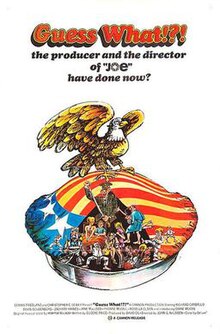Guess What We Learned in School Today?
| Guess What We Learned in School Today? | |
|---|---|
 Theatrical release poster | |
| Directed by | John G. Avildsen |
| Written by | Eugene Price |
| Produced by | James U. Clarke Christopher C. Dewey Dennis Friedland David Gil |
| Starring | Dick Carballo Devin Goldenberg Zachary Hains |
| Cinematography | John G. Avildsen |
| Edited by | John G. Avildsen |
| Music by | Harper MacKay |
Production company | |
| Distributed by | Metro-Goldwyn-Mayer |
Release date | 19 May 1971 |
Running time | 96 minutes |
| Country | United States |
| Language | English |
Guess What We Learned in School Today? (also released in the United States as I Ain't No Buffalo) is a 1970 film directed by John G. Avildsen and written by Eugene Price. The movie premiered at the Cannes Film Festival in 1970 and opened in the United States in 1971. Although it was shot before Avildsen's Joe, it got distribution after due to Joe's success.
Tagline: "Love American style with a touch of X."
Plot
Parents in a small, conservative community want to ban sex education in schools, labeling it a Communist plot. However, the two people leading the charge against sex ed are revealed to be an impotent alcoholic and a gay policeman.
Principal cast
| Actor | Role |
|---|---|
| Dick Carballo (as Richard Carballo) | Lt. Roger Manley |
| Devin Goldenberg | Robbie Battle |
| Zachary Hains | Lance Battle |
| Jane McLeod | Rita Battle |
| Yvonne McCall | Dr. Lily Whitehorn |
| Rosella Olsen | Eve Manley |
| Diane Moore | Lydia |
| Robert Emery | Al |
Critical reception
Roger Greenspun of The New York Times did not care for the film at all:
... [T]here are ineptitudes and unrewarding obscurities enough to sink the movie... The movie it keeps trying to be, however, is an amalgam of social satire and sane sex propaganda and it succeeds with neither... time and again it comes to look like a series of blackout skits from the more inhibited edges of an exploitation movie.[1]
See also
References
- ^ "Original New York Times review". Movies.nytimes.com. Retrieved 5 October 2010.
External links
